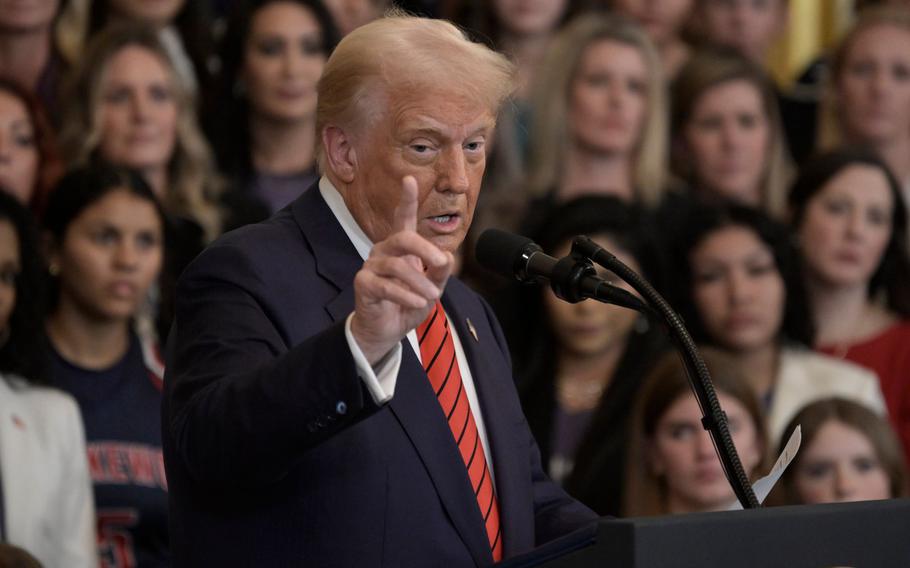
Donald Trump speaks before signing an executive order on Feb. 5, 2025. (Lenin Nolly/SOPA Images via TNS)
No one can fault Donald Trump for failing to accomplish at least one of the things he promised while he was a candidate: disruption.
But is it too much? A MAGA friend assures me that Trump’s 77 million voters approve of his actions so far and that they are not having second thoughts.
But I wonder. If, before the election, Trump had described some of the actions that he’s taken during the first weeks of his administration, would all of his voters have marked their ballots for Trump?
There are several ways to approach this question, but consider Gaza. What if, before Nov. 5, Trump had said that the United States was going to take over Gaza from Israel; deport 2 million Gazans, using U.S. troops, if necessary; level the place; and then construct the “Riviera of the Middle East”? Would all of those 77 million Americans have still voted for him?
Of course, last November most Americans were more concerned about the price of eggs and gas than about Gaza. Trump attracted many voters with his promise of near-immediate relief from the pain of President Joe Biden’s inflation.
But what if Trump had said that as soon as he was inaugurated he planned to impose massive tariffs, not only on our adversaries, but on our allies and biggest trading partners?
What if, before we voted, he had said what he said on Feb. 3: “WILL THERE BE SOME PAIN? YES, MAYBE (AND MAYBE NOT!) BUT WE WILL MAKE AMERICA GREAT AGAIN, AND IT WILL ALL BE WORTH THE PRICE THAT MUST BE PAID.”?
What about the Jan. 6 “patriots”? Before the election Trump said that he planned to review their convictions on a “case-by-case” basis, implying that insurrectionists who attacked police officers would not be pardoned. He was so convincing that Vice President JD Vance said just before the inauguration: “If you committed violence on that day, obviously you shouldn’t be pardoned.”
Trump’s new attorney general, Pam Bondi, used the “case-by-case” language, as well, adding that she condemns “any violence on a law enforcement officer.”
But what if Trump had said that as soon as he became president he would forget about “case-by-case” review and proclaim a blanket pardon for all 1,500 offenders, including those who attacked police officers, as well as criminals such as Enrique Tarrio and Stewart Rhodes, both convicted of seditious conspiracy?
Before the election, Trump said, “I am your warrior, I am your justice…I am your retribution.”
But retribution — especially against supposed political enemies — makes citizens in a democratic republic uneasy. Even Trump knows this. He quickly backtracked, redefining retribution as “success” in an attempt to make it sound more palatable to voters.
But now that he’s in office, it’s clear that he’s interested in going after those that he imagines went after him. Last week Bondi created the Weaponization Working Group. Bondi seems oblivious to the group’s ambiguous and ironic title, but its intent is clear: Jack Smith, Alvin Bragg and Leticia James are targeted, by name, along with their staffs.
What if Trump had said, before the election, that he might use American troops to seize the Panama Canal? What if he had said he would permit the sudden destruction of the U.S. Agency for International Development? What if he had said he planned to nominate Matt Gaetz for attorney general, a candidate so unqualified and unsuited that even Republicans couldn’t hold their noses long enough to confirm him?
Another MAGA friend always tells me: Don’t listen to what Trump says; look at what he does. But this advice overlooks the fact that what presidents and presidential candidates say, and don’t say, is crucial.
Many are delighted with Trump’s actions. But one wonders whether some of the voters in the 1.5% of the electorate by which Trump won the popular vote would have made a different choice if they could have foreseen the gap between what Trump said, or didn’t say, during the campaign and what he has done during his first three weeks in office.
Too late now, of course. Too bad Trump didn’t tell us sooner.
John M. Crisp, an op-ed columnist for Tribune News Service, lives in Texas.